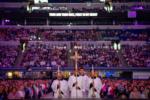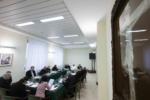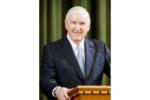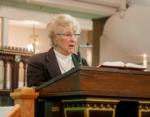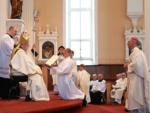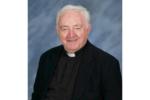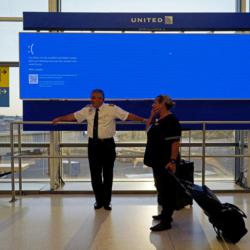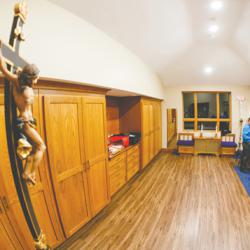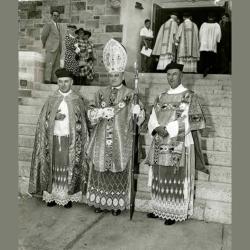Latin patriarch: The time has come for political leaders to make good on statehood slogans as war rages
JERUSALEM (OSV News) -- The current war between Israel and Hamas may finally force a diplomatic solution to the long intractable tensions between the Israelis and the Palestinians in the Holy Land, said the Latin patriarch of Jerusalem.
Cardinal Pierbattista Pizzaballa, 58, who has served as patriarch of Jerusalem since November 2020, said that while there have been constant conflicts between Israel and the Palestinians since the State of Israel was formed in 1948 and even earlier, this time, it feels very different, and a comprehensive political solution may be the only way to stop the ongoing bloodshed.
"It is a political conflict, first of all, that now is assuming more and more religious connotations, unfortunately. This makes things more difficult because religion is less open to any kind of compromise," Cardinal Pizzaballa told the Rhode Island Catholic, the newspaper of the Diocese of Providence, in an Oct. 27 interview at the Latin Patriarchate in Jerusalem's Old City.
Cardinal Pizzaballa said that now is the time for leaders to concentrate their efforts on finding a viable solution for all those living in the Holy Land, including the Palestinians living in the West Bank as well as the Gaza Strip.
While the focus of the war has been on the Gaza Strip, after Hamas terrorists breached the border and killed more than 1,200 Israelis and people of other nationalities and kidnapped about 240 others in a brazen attack on Oct. 7, Palestinians living in the West Bank have become increasingly agitated.
They are decrying what they feel is Israel's disproportionate use of force in its goal to dislodge and decimate Hamas in Gaza, ending the terror organization's 16-year rule over the coastal enclave, since it ousted the Palestinian Authority in 2007. The PA still controls parts of the West Bank. The latest figures released by the Gaza Health Ministry indicate that more than 16,000 Palestinians overall have been killed, of them more than 3,000 children.
The IDF has also gone into the West Bank in search of Hamas operatives who are known to reside there, and outbreaks of violence have erupted. Tourism has all but ceased in Bethlehem, leading to the closure of many local businesses that support visitors, according to a local Catholic pastor there.
Cardinal Pizzaballa feels that the time is now for political leaders to finally make good on slogans that have only paid lip service to resolving the long-term conflict.
"I think that, first of all, what is missing over the last 20 years is a lack of projects. We need a political project for these two peoples. A Two-State Solution was a slogan without content for many years. Now, we have to give to this slogan some content," he said.
"Now, it is quite difficult, but this situation reminds us that it is necessary to find a solution," he said.
The Latin patriarch has visited Gaza several times, with his last visit there being about seven months ago. He described the bleak conditions that many of the 2.2 million people living in the Gaza Strip -- which is approximately six miles wide and 25 miles long -- endure each day. Of those 2.2 million, there are about 1,000 Christians living in Gaza.
"The situations they are living in are very problematic, but, at the same time, I saw a very serene community, a Christian Catholic community. It is the smallest community and the less-complaining community. They are aware that they are much supported by us," Cardinal Pizzaballa said.
While the Christian community in Gaza is exponentially smaller than the Muslim community among the 2.2 million residents -- nearly 90% of whom are currently displaced from their homes by the war -- it has had an outsized footprint on everyday life there.
According to Joseph Hazboun, regional director of the Catholic Near East Welfare Association's Jerusalem Field Office, CNEWA has been providing support to 17 local agencies working in the health, education and social services sectors of the areas they serve. The organization served between 300,000 and 400,000 people a year. It's not their numbers; it's their services that they provide," Hazboun said in an interview with Rhode Island Catholic.
Cardinal Pizzaballa said that Christians have mostly had normal relations with Muslims in Gaza.
"They try to have as good a friendship as possible, but of course they also have the radical ones," he said, noting the existence of some radical factions among the Muslims who would rather disrupt peaceful relations with Christians than promote them.
"You can build your relations with those that are accepting you," he added. Cardinal Pizzaballa was in Rome on Oct. 7, and said he had not yet received the news of the brutal attack on Israel until he was called by a priest in Jerusalem for an official comment.
Before he left to return to Jerusalem, the patriarch spoke with Pope Francis about the unfolding situation.
"He expressed to me his sorrow and pain and said that I should do everything to stop this war and to try reconciling the positions as much as possible," Cardinal Pizzaballa said.
"The pope is only repeating what he has been writing all along, that war is a defeat, any war is a defeat," Cardinal Pizzaballa added.
When the cardinal arrived back in Jerusalem, the tenor felt different from previous conflicts he had experienced in the Holy Land since he had entered the first of several positions he had held there since 1990.
"There was a level of perception that this is something new and that maybe, with time, it will become clearer," he said.
The cardinal released a pastoral letter to the faithful of his diocese, condemning acts of violence and calling for a just and lasting peace in the Holy Land.
He denounced unequivocally the "atrocity" that Hamas wrought upon Israel on Oct. 7, noting that violence is not compatible with the message of the Gospel and will never bring peace.
At the same time, Cardinal Pizzaballa called for an end to the "decades of occupation" and "a clear and secure national perspective to the Palestinian people," which he said is the only way that a serious peace process can begin.
"We owe it to the many victims of these days and to those of years past," he said. "We do not have the right to leave this task to others."
In the context of a media interview, which he granted shortly after his return from Rome, Cardinal Pizzaballa suggested that he would offer to trade himself for the hostages held by Hamas. The news went viral, traveling around the world almost immediately, even before he had a chance to discuss it with his superiors.
But the Latin patriarch feels that one must always be bold and assert their message of truth, regardless of how political officials may react.
"It is difficult, of course, because we are in very polarized positions," Cardinal Pizzaballa said. "Everyone wants you to say what they want to hear, while I have to say and what I feel in conscience I need to say according to the Gospels. And that is not immediately understood."
- - - Rick Snizek is executive editor of Rhode Island Catholic, the newspaper of the Diocese of Providence. He reported from the Holy Land. - - -
BRIEF: JERUSALEM (OSV News) -- The war between Israel and Hamas may finally force a diplomatic solution to the long intractable tensions between the Israelis and the Palestinians in the Holy Land, said the Latin patriarch of Jerusalem. Cardinal Pierbattista Pizzaballa, 58, who has served as patriarch of Jerusalem since November 2020, said that while there have been constant conflicts between Israel and the Palestinians since the State of Israel was formed in 1948 and even earlier, this time, it feels very different, and a comprehensive political solution may be the only way to stop the ongoing bloodshed. "It is a political conflict, first of all, that now is assuming more and more religious connotations, unfortunately. This makes things more difficult because religion is less open to any kind of compromise," Cardinal Pizzaballa told the Rhode Island Catholic, the newspaper of the Diocese of Providence. The cardinal said that now is the time for leaders to concentrate their efforts on finding a viable solution for all those living in the Holy Land, including the Palestinians living in the West Bank as well as the Gaza Strip. Cardinal Pizzaballa feels that the time is now for political leaders to finally make good on slogans that have only paid lip service to resolving the long-term conflict. "A Two-State Solution was a slogan without content for many years. Now, we have to give to this slogan some content," he said. "This situation reminds us that it is necessary to find a solution."


